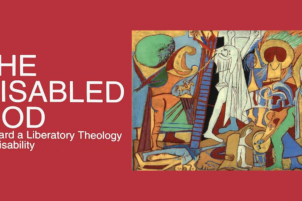
Julian Gavino
Kabbalah, or Jewish mysticism, offers us a beautiful explanation for those who convert to Judaism. Conversion isn’t seen as a choice as much as it is a calling—specifically a calling from Abraham and Sarah who are considered the forebearers of Judaism. The souls of their children are thought to be dispersed throughout the world, some born to Jewish parents, and others not. When an individual converts, we believe their soul was Jewish all along, a long-lost soul that felt an intense pull toward the Jewish people destined to return home to their parents Abraham and Sarah.
This is what finding both a literal and spiritual space in Judaism felt like for me, coming home.
I had already been immersed in Jewish life before announcing to my partner I wanted to find a synagogue for us to attend. She was born Jewish, so I had been observing her family traditions and soaking in their way of life for some time. I was truly insatiable to learn more. On a 16-hour road trip to our new home in Philadelphia, I divulged my deepest spiritual desires to her about how I felt called to Judaism. Many beautiful and tearful conversations later, I got on my phone to Google “LGBTQ+ and disability-friendly synagogues in Philadelphia.”
An immediate hit popped up for a congregation called Rodeph Shalom. Their mission statement caught my eye.
“We who are new to synagogue life or have extensive Jewish backgrounds; we who are Jewish or who share our lives with Jews; we who live within different family constellations, who are of all abilities, gender identities, sexual orientations, races, and generations: we enter the synagogue to celebrate, to learn, to laugh, to heal, to pray, to challenge ourselves, and to connect with others about the deepest questions of our lives.”
Excitement overtook me. As a disabled power-chair user and queer individual, I felt invited by this language. However, I remained cautious, just in case the mission statement happened to be virtue signaling and not genuine inclusion. We made an appointment for a tour and informational conversation with the executive directors. I was extremely nervous. Nerves melted away as I noticed details like automatic push-button doors, smooth floors, ramps, gender-neutral accessible bathrooms, pride flags, and a mezuzah at wheelchair-height.
Rodeph Shalom was founded in 1795 and is the oldest Ashkenazic congregation in the Western Hemisphere. Largely inaccessible, the congregation took action in the 2000’s to undergo major accessibility changes. As we were listening to this story, I marveled at the now blocked-off original entrance and lobby. Beautifully preserved, it’s now showcased as a museum where congregants can view artifacts and read historical information. It is a delightful reminder that historical preservation and accessibility can indeed marry.
While I was thrilled by the accessibility, what I really needed to know was how the congregation viewed disability. As the tour came to a close, we sat down to talk. Minutes turned into hours. I felt safe opening my heart to discuss my hopes and fears. The directors listened as I spoke about previous religious trauma, ostracization due to my disability, and rampant homophobia in my family and community. I expressed my deep pull toward Judaism, and my hesitancy to dive in after being burned by religious institutions in the past.
Ellen, one of the directors, grabbed my hand and looked deeply into my eyes. As she spoke, I could palpably feel her grief in reaction to my story. She gave her word that Rodeph Shalom is more than ramps and automatic doors. She assured me of the conscious and continuous effort so all congregants could have a voice and a seat at the table. They assured me that I would lead, and they would follow.
Two years later, I reflected on my original fears as I stood on the accessible Bima (alter) to celebrate my conversion and be publicly announced as a Jew. All those fears seemed so far away now. This was the first time in my life that I didn’t feel hyperaware of my queerness or disability. Nobody ever asked me what was wrong with me, tried to pray over me, or excluded me from any activities. They simply asked what accommodations I needed and came through each and every time. Any feedback I had was both welcomed and incorporated. When I was sick or hospitalized, support was given, no questions asked.
I was in awe. This is what it felt like to be normalized, to be treated as equal.
During my studies for conversion, I worked with Rabbi Eli Freedman. He taught me that relationships between congregants and religious leaders should be symbiotic. We were always learning from one another. His commitment to learning and curiosity was contagious, inspiring me to always keep asking questions and advocate for my voice. This mirrors the attitude I developed in the disability community where I learned to advocate fiercely for my health, accessibility, and opportunities. Rabbi Freedman always reminded me that because we don’t have all the answers, we must keep an open heart and mind to what’s going on around us.
If G-d could wave a magic wand and fix everything, maybe G-d would—but that hasn’t happened yet. All we have is the present with one another. Change is messy, but it starts with conversations. With Teshuva approaching, we can commit to turning over a new leaf. It’s never too late to make your synagogue accessible to disabled people. Not just with ramps and elevators, but with your hearts and minds. Accessibility isn’t just infrastructure—it’s an entire culture and mindset.
I was blessed to find an accessible spiritual home. I hope this call to action inspires other congregations to invite disabled people to find their own accessible spiritual home.








Julian, Nicely done.